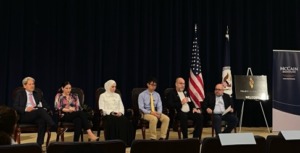
Hostage and Wrongful Detainee flag first raised in recognition of current and former detainees, families of those detained
WASHINGTON, D.C. (March 18, 2024) – The McCain Institute at Arizona State University (ASU) recently co-hosted, “Keeping Faith with American Hostages, Wrongful Detainees, and Ourselves,” a two-part event series in partnership with the James W. Foley Foundation. These events commemorated the inaugural Hostage and Wrongful Detainee Day on March 9 and the third anniversary of the Levinson Act, which honors the memory of former FBI agent Robert Levinson, the United States’ longest-held hostage.
The event series began with remarks from Representatives French Hill (R-AR-02) and Haley Stevens (D-MI-11), the co-chairs of the U.S. House of Representatives’ Hostage Task Force, and the House co-sponsors of the National Hostage and Wrongful Detainee Day, which was signed into law as part of the FY2024 National Defense Authorization Act (NDAA).Representative Nick LaLota (R-NY-01) spoke on behalf of his constituents, Harrison Li, and his father Kai Li, who has been wrongfully detained in China since 2016. Aida Dagher and Jonathan Dekel-Chan also spoke for their wrongfully detained loved ones.
The March 8 panel, moderated by American journalist and former detainee Jason Rezaian, discussed the toll of hostage-taking on families. The event began with remarks from Secretary of State Antony Blinken (via a pre-recorded video) and concluded with the ceremonial first raising of the hostage and wrongful detainee flag. U.S. Special Presidential Envoy for Hostage Affairs (SPEHA) Ambassador Roger Carstens and Deputy Secretary of State Kurt M. Campbell delivered remarks honoring the new flag.
“The symbolism of both the date, March 9, and the design of this flag carry particular significant meaning,” said Deputy Secretary of State and former McCain Institute Kissinger Fellow Kurt M. Campbell. “It is a day to celebrate those who have returned home, but also to recognize those Americans still unjustly held overseas and the work that needs to continue to be done immediately to secure their release.”
The second part of the series included an event on March 13 in which Ambassador Carstens, FBI Hostage Recovery Fusion Cell Director Raj Maan, Diane Foley, mother of slain journalist James Wright Foley, and Sara Moriarty, daughter of Robert Levinson (via video) gathered in the U.S. Capitol to discuss the national crisis of hostage-taking. The panel, moderated by The Wall Street Journal National Security and Foreign Policy Editor Sharon Weinberger, focused on the U.S. government’s response to hostage-taking since the creation of the Office of the Special Presidential Envoy for Hostage Affairs in 2015, and what can be done to prevent the future taking of American hostages. U.S. Senator Chris Coons (D-Del.) delivered remarks on his decision to co-introduce the bipartisan bill that led to the establishment of March 9 as National Hostage and Wrongful Detainee Day, as well the 2020 Robert Levinson Act, which he co-sponsored.
“I know that I’ve heard from some families that had seen the flag raised, that it’s really meaningful because it shows that us as families—as victims—of this hostage taking, of this barbaric practice, are being heard and being seen, and that our government is being held accountable for it,” said Sarah Moriarty, daughter of Robert Levinson, the longest-held U.S. hostage. “It’s a physical reminder of both our success and our failures.”
“John McCain was held as a prisoner of war for 1,966 days by the Viet Cong. He refused to be released before other American POWs,” said McCain Institute Assistant Director of Democracy Programs Pedro Pizano. “We, at the McCain Institute, know that for those being detained or held wrongfully, there is nothing more painful than being forgotten.”
To watch the March 8 event, click here. To watch the March 13 event, click here.
About the McCain Institute at Arizona State University
The McCain Institute is a nonpartisan organization inspired by Senator John McCain and his family’s dedication to public service. We are part of Arizona State University and based in Washington, D.C. Our programs defend democracy, advance human rights and freedom, and empower character-driven leaders. Our unique power to convene leaders across the global political spectrum enables us to make a real impact on the world’s most pressing challenges. Our goal is action, not talk, and like Senator McCain, we are fighting to create a free, safe, and just world for all.
About Arizona State University
Arizona State University has developed a new model for the American research university, creating an institution that is committed to access, excellence and impact. ASU measures itself by those it includes, not by those it excludes. As the prototype for a New American University, ASU pursues research that contributes to the public good, and ASU assumes major responsibility for the economic, social and cultural vitality of the communities that surround it.
Contact:
McCain Institute Press
[email protected]
202-601-4296